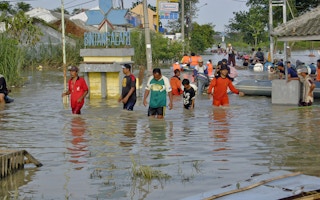Cities, as economic engines and populations hubs, must be at the centre of attempts to overcome the tripartite challenge of Covid-19 recovery, sustainable and inclusive development and climate change, according to a report by the Coalition for Urban Transitions published on 17 March.
To continue reading, subscribe to Eco‑Business.
There's something for everyone. We offer a range of subscription plans.
- Access our stories and receive our Insights Weekly newsletter with the free EB Member plan.
- Unlock unlimited access to our content and archive with EB Circle.
- Publish your content with EB Premium.
More than half the world’s population dwell in cities, and by 2050 the United Nations expects that proportion to reach 68 per cent. The Coalition for Urban Transtion’s report focused on six emerging economies that represent about 40 per cent of the world’s population.
China, India, Indonesia, Brazil, Mexico and South Africa – which account for a third of global GDP and about 40 per cent of carbon dioxide emissions from fossil fuel use – could cut annual emissions by up to 90 per cent by 2050 by adopting a bundle of low-carbon measures, the report said.
Adopting the low-carbon measures could bring $12 trillion in net benefits by 2050, based on cost savings alone and could create millions of new jobs by 2030 – including 8 million in India, 15 million in China and 2.3 million in Indonesia, according to the report’s findings.
“The opportunity for cities to be a meaningful part of tackling the climate crisis cannot be understated,” said Manuel Pulgar-Vidal, global leader, climate and energy, World Wide Fund for Nature (WWF) International, and coalition senior ambassador.
Some of the measures include building resilience to more extreme weather – a priority becoming more urgent as more of Asia’s populations are flocking to coastal cities - even as the risk of flooding increases. As cities sprawl, the flood-risk will spike, making millions of homes vulnerable. The Asian Development Bank reckons that the number of people living in flood plains in Asia is expected to more than double between 2000 and 2060. Thirteen of the 20 cities projected to have the biggest increase in annual losses caused by flooding between 2005 and 2050 are in Asia.
The reports notes that projects designed to withstand coastal flooding can create new vulnerabilities by hardening shorelines through the elimination of protective ecosystems. In Semarang, Indonesia a port expansion is reclaiming over 100 hectares of coastal land with similar developments in parts of China. Some 110 million live in 60 Indonesian cities. “Buidling resilience to floods and other shocks is an urgent priority for Indonesia’s urban areas,” the report said.
The report recommended restoring peatlands and protecting mangroves near coastal cities, which can have the double effect of cushioning cities against the risk of flooding and coastal storm surges as well as creating powerful carbon sinks. In Indonesia, restoring coastal peatlands would not only reduce land subsidence and flood risks, but also avoid large amounts of greenhouse gas emissions and air pollution from fires.
Millions of people across the six countries are living in “precarious conditions that make them deeply vulnerable…to a wide range of shocks,” the report said. Pollution is a major issue in all six countries which are home to some of the dirtiest cities on the planet affecting the lives of millions. Urban sprawl is mounting pressure on inadequate transport infrastructure exacerbating the problem.
Public transport offers attractive investments in India, which has some of the most polluted cities in the world. Investing $79.1 billion by 2050 could bring returns with a net present value of $1.4 trillion, according to the report. It would also reduce air pollution and traffic congestion, “two urgent concerns for India”.
High-quality social housing, connected to public transport and key urban services would ensure that the urban poor are connected to better jobs and educational opportunities creating an equal playing field that addresses some of the inequalities that plague cities. “Governments must act now to make cities more inclusive and ensure the most vulnerable are not left behind,” said Sheela Patel of Slum Dwellers International.
Low-carbon measures directly boosts resilience, and the coalition recommends retrofitting old buildings and prioritising affordable energy-efficient buildings with rooftop solar panels driving down the cost of energy while bridging the gap left by ailing power supply.
“Focusing on compact, connected and clean cities…will be at the heart of achieving climate ambitions and to finding a new path to strong, sustainable, resilient and inclusive growth,” said Professor Lord Nicholas Stern, chair of the Grantham Research Institute on Climate Change and the Environment at the London School of Economics.








